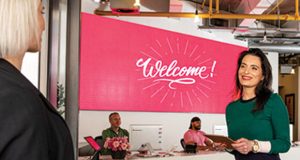 THE PROPERTY AND FM EXPERT’S VIEW
THE PROPERTY AND FM EXPERT’S VIEW
VAUGHAN WILLIAMS,
HEAD OF GROUP PROPERTY & FACILITIES MANAGEMENT, SHAFTESBURY GROUP
One in six people use public transport to get to work across the UK, rising to every other worker living in London. When surveyed, 65 per cent of people said they no longer felt comfortable commuting to work via public transport, and 69 per cent said they would find alternative modes of transport due to COVID. This equates to an extra 6.15 million people that will be looking for an alternative to public transport to commute to work. Operators around the country are also under pressure to promote social distancing and thereby reduce capacity, and so the pressure is on to find a solution that solves both issues.
Understanding and anticipating the needs of employees as an FM is increasingly complicated in a world dominated by social distancing, increased cleaning, remote working, and the futile battle of limiting numbers in the workplace kitchen.
Workplaces were cramped before social distancing was around. Space is an expensive resource, and it is easy to understand why showers, changing facilities, and bike storage are a rarity. It is also critically important that we dissuade commuters not to jump into their car to avoid the train. For the benefit of those looking to run, walk, or cycle into work, there needs to be an urgent reassessment of the facilities available. But with the number of workers returning to work environments increasing week by week leading up to Summer (subject to Government guidance), we do not have long to find the solution.
Commuting has a major impact on our sense of wellbeing and work satisfaction, with 23 per cent of people reporting they have left a job previously because of the commute. So, before we tackle the difficult problem of enhancing facilities to accommodate people getting to work under their own steam, it is important to understand how your workplace can be flexible in accommodating remote working moving forwards. We could write a book on flexible working but that is beyond this piece, and so I simply say that we have a responsibility to consider our employees wellbeing above all else.
The unseen benefit to a more fluid workplace population is that there may be opportunities to capitalise on the spare space! Social distancing will, eventually, become a thing of the past (or at least reduce back down to 1m+). With people working remotely, there are easy wins in the office such as reducing desks but enabling desk booking to ensure we are using all available space. This coupled with antiviral coatings, thorough cleaning methods and good IAQ, means the workplace once again becomes a haven for being a safe, productive environment. Regardless, it is important to consult with your workforce to understand how they envisage using the space.
Twenty one per cent of job seekers consider the presence of facilities such as showers, bike storage, lockers, changing spaces and cycle-to-work schemes in their decision to join a company. It is no longer just a case of aiding people in getting into the workplace, but a critical factor in attracting and keeping talent. The cost benefit analysis of retrofitting such facilities should take this into account in the inevitable budgetary debate that ensues, as well as the cost implications of less in-situ desk space.
COVID has the potential to be the catalyst for an improved work-life balance, with a more conscientious workplace offering. Let us not lose that momentum in the coming months.
 THE HR DIRECTOR’S VIEW
THE HR DIRECTOR’S VIEW
JASMINE HUDSON,
HR DIRECTOR FOR MITIE GROUP
The pandemic has had a huge impact on the way we all commute. While many of our frontline heroes have been commuting throughout the pandemic, with the increase in people working from home, for some there is no commute at all. However, others are looking at how they can travel safely via public transport, whilst others are looking for greener options, be that opting for an electric vehicle (EV) or cycling to work so they don’t add to road congestion and pollution. As we move into a post-COVID world, it is vital that organisations support their employees with safe and sustainable journeys to work.
As the Government continues to focus on net zero and the number of Clean Air Zones increases, the volume of non-electric vehicles in city centres is set to fall. Coupled with many of us wanting to be more active and avoid busy transport, commuting by bike is sure to grow in popularity once offices begin to reopen. Creating a green travel plan can help make this an easy switch and is where FMs can take the lead. This will include reviewing current policies, conducting staff surveys and auditing sites to ensure they have the facilities needed – such as lockers, bike racks and showers – for anyone who chooses to cycle.
Of course, bikes, and all the safety gear, can be expensive, which is where schemes like Cycle2Work come in. Our people told us they wanted to get on their bikes, so to help more of them do this, in June 2020 we increased Mitie’s Cycle2Work allowance from £2,000 to £3,000. This has enabled employees to invest in better quality bikes and all the kit they need to go with it. As a result, applications increased by 57 per cent compared to the previous year.
FMs also play a key role in looking after our public transport systems and ensuring they’re as safe as possible, especially in the past year. This includes introducing a number of new measures and innovations to enhance cleaning regimes, including anti-viral misting, the use of ultraviolet light to clean high-touch point areas, and the use of long-lasting disinfectants.
Still, we know first-hand that for many job roles in the facilities management industry, relying on public transport isn’t always practical. For those that depend on their car or van, switching to EVs is a good example of how companies can balance  their employees’ wellbeing and the business’ net zero goals. As well as their clear environmental benefits, EVs have several other perks, including lower running costs and being more pleasant to drive. We’re passionate that the future of fleets is electric, with 1,000 Mitie EVs already on the road, and the feedback from our EV drivers is overwhelmingly positive.
their employees’ wellbeing and the business’ net zero goals. As well as their clear environmental benefits, EVs have several other perks, including lower running costs and being more pleasant to drive. We’re passionate that the future of fleets is electric, with 1,000 Mitie EVs already on the road, and the feedback from our EV drivers is overwhelmingly positive.
But sometimes, it’s the simple solutions that have a big impact – be that allowing colleagues to be flexible with their start and end times to travel when it’s quieter, providing information on alternatives to car sharing, or giving employees face coverings for their commutes, as we have at Mitie. No two businesses, sites or employees are the same, but by considering all the options we can help our colleagues travel to work safely and sustainably.




